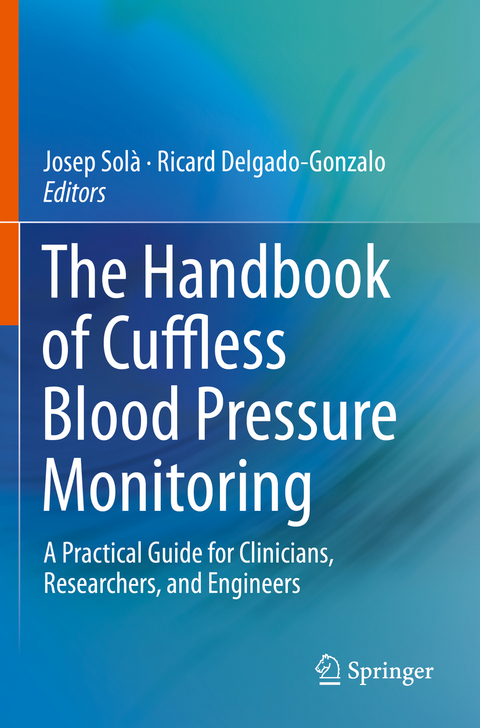
The Handbook of Cuffless Blood Pressure Monitoring
Springer International Publishing (Verlag)
978-3-030-24703-4 (ISBN)
This book is the first comprehensive overview of the emerging field of cuffless blood pressure monitoring. Increasing clinical evidence proves that longitudinal measurements of blood pressure allow for earlier detection and better management of multiple medical conditions and for superior prediction of cardiovascular events. Unfortunately, today's clinical and industry standards for blood pressure monitoring still require the inflation of a pneumatic cuff around a limb each time a measurement is taken. Over the last decades clinicians, scientists and device manufacturers have explored the feasibility of technologies that reduce or even completely eliminate the need of cuffs, initiating the era of cuffless blood pressure monitoring. Among the existing literature, this book is intended to be a practical guide to navigate across this emerging field. The chapters of the handbook have been elaborated by experts and key opinion leaders in the domain, and will guide the reader alongthe clinical, scientific, technical, and regulatory aspects of cuffless blood pressure monitoring.
lt;p>Josep Solà
Passionate about the intersection of engineering and clinical work, Josep has spent 15 years doing research and development in the field of cuffless blood pressure monitoring. He graduated as a signal processing engineer at the Catalonia Polytechnic University (UPC), then completed his Master's Thesis at Sony International in Germany, before ultimately arriving in Switzerland in 2004 at the Swiss Center for Electronics and Microtechnogy (CSEM). At that time the Swiss institute was revolutionizing the field of wearable monitoring by showcasing the first measurements of Heart Rate at the wrist via optical sensors in motion. Interested in signal processing problems for non-invasive cardiovascular monitoring, he started exploring and benchmarking sensing modalities that could potentially lead to more widespread use of cuffless blood pressure devices. His research covered hybrid uses of Photo-Plethysmograhy (PPG), Electro-Cardiography (ECG), Impedance Cardiography (ICG), Phono-Cardiography (PCG) and Electrical Impedance Tomography (EIT). In 2012 he completed his PhD thesis at the Swiss Federal Institute of Technology in Zurich (ETHZ), titled "Continuous blood pressure monitoring." He then focused all his efforts on how PPG sensing could be upgraded to provide clinically valuable blood pressure determinations in real life scenarios. In 2018 he co-founded Aktiia, a tech company that aims at bringing blood pressure monitoring to daily life.
Ricard Delgado-Gonzalo is the principal research scientist leading the Digital Health activity at the Swiss Center for Electronics and Microtechnology (CSEM). Trained as a Mathematician and as an Engineer at the Polytechnic University of Catalonia (UPC), he obtained his Ph.D. on biomedical image analysis from the Swiss Federal Institute of Technology in Lausanne (EPFL) within the SystemsX.ch consortium, the Swiss research initiative for the promotion of Systems Biology. He was awarded with the SSBE Research Award 2013 from the Swiss Society of Biomedical Engineering for the best PhD thesis, and the ABB Award 2014 for his "contributions to the field of bioimage informatics." His current research focuses on AI applied to biomedical embedded systems, wearable technology, and their impact on the future of healthcare and the MedTech industry with more than 40 scientific publications on the topic.
Cuffless blood pressure monitoring and the advent of a new era in medicine and society.- Clinical Relevance of continuous and cuffless blood pressure monitoring.- A Historical Journey on the Physiology of Blood Pressure Monitoring.- The definition and architecture of cuffless blood pressure monitors.- Pulse Arrival Time: History and Devices.- Pulse Wave Velocity Techniques.- Concepts of Pulse Decomposition Analysis.- Pulse wave analysis techniques.- Machine Learning Techniques for Cuffless Blood Pressure Estimation.- Initialization of Pulse Transit Time-Based Blood Pressure Monitors.- Key Regulatory Aspects and the Importance of Consensus Standards in Bringing Devices to Market.- Design of Clinical trials to validate cuff-less blood pressure monitors.- Cuffless Blood Pressure Monitoring: The Future for the Evaluation and Management of Hypertension.- Index.
| Erscheinungsdatum | 04.09.2020 |
|---|---|
| Zusatzinfo | XII, 239 p. 79 illus., 51 illus. in color. |
| Verlagsort | Cham |
| Sprache | englisch |
| Maße | 155 x 235 mm |
| Gewicht | 391 g |
| Themenwelt | Medizin / Pharmazie ► Physiotherapie / Ergotherapie ► Orthopädie |
| Naturwissenschaften ► Biologie ► Genetik / Molekularbiologie | |
| Technik ► Umwelttechnik / Biotechnologie | |
| Schlagworte | Calibration cuffless BP monitors • classification cuffless BP monitoring • clinical trials cuffless BP • Computational Biology • Cuffless Blood Pressure Monitoring • cuffless BP monitoring strategies • Electrocardiography • Non-invasive Blood Pressure Monitoring • Photoplethysmogram • Pulse Arrival Time • Pulse Transit Time • Standardization cuffless BP monitoring • trends cuffless BP monitoring |
| ISBN-10 | 3-030-24703-1 / 3030247031 |
| ISBN-13 | 978-3-030-24703-4 / 9783030247034 |
| Zustand | Neuware |
| Informationen gemäß Produktsicherheitsverordnung (GPSR) | |
| Haben Sie eine Frage zum Produkt? |
aus dem Bereich


